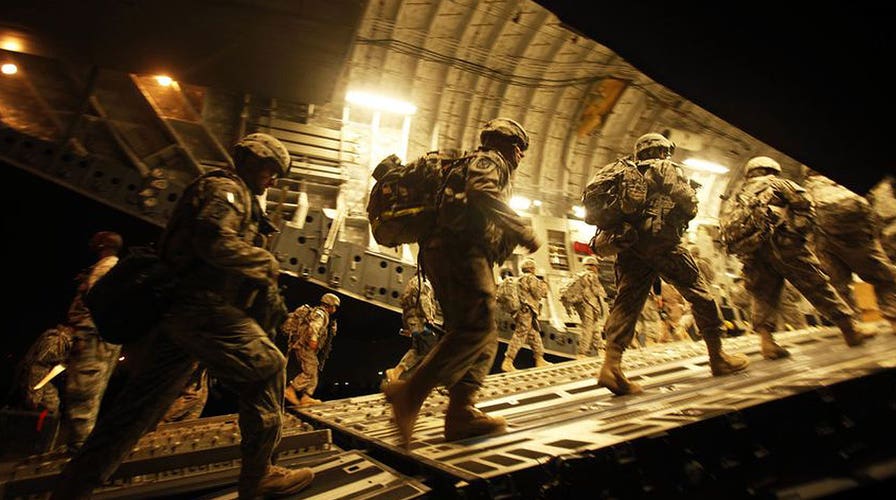More US troops headed to Iraq to help in ISIS fight
Defense Secretary Carter announced additional troops will help Iraqi forces retake Ramadi; Jennifer Griffin reports for 'Special Report'
Despite pledges from the Obama administration to “accelerate” the war against the Islamic State and a top envoy claiming “this perverse caliphate is shrinking," the Pentagon admitted Monday it had retaken only 5 percent of ISIS-held territory in Iraq in the past five months.
President Obama announced at the Pentagon in December that 40 percent of ISIS-held territory in Iraq had been recaptured by Iraqi security forces backed by thousands of airstrikes from the U.S.-led coalition, a number officials repeated for five months.
But on Monday, Pentagon Press Secretary Peter Cook said 45 percent of ISIS territory had been taken back in Iraq, or a modest 5 percentage-point gain from December.
Cook said 16-20 percent of ISIS-held territory had been taken from ISIS in Syria, a similar estimate given in January.
Director of National Intelligence James Clapper said last week that it was unlikely ISIS would be pushed out of Mosul, Iraq’s second-largest city, during the Obama administration.
Despite the modest gains against ISIS, Cook said Secretary of Defense Ash Carter was “satisfied” with the pace of operations. When asked why the hundreds of additional forces announced by Carter last month were not on the ground in Iraq, Cook said, “We always anticipated there would be some sort of lag time between decisions and ultimately implementation.”
Speaking earlier Monday from Amman, Jordan, the president’s envoy in the ISIS fight, Brett McGurk, said "this perverse caliphate is shrinking."
In recent months, the U.S. military reported it had destroyed hundreds of millions of dollars in ISIS cash and robbed the group of 50 percent of its oil revenue.
In another sign of the challenge to liberate Mosul from ISIS, Col. Steve Warren, a military spokesman based in Baghdad, said 50 percent of the Iraqi security forces were in Baghdad to keep order amid recent uprisings against embattled Iraqi Prime Minister Haider al-Abadi. A slew of recent bombings in Baghdad claimed by ISIS have killed dozens.
Cook also told reporters the Pentagon had not been asked to help arm Libyan government forces or rebels to battle ISIS. “There has not been any particular marching orders to us,” he said.
Cook did acknowledge publicly there were a “small number” of U.S. troops on the ground in Libya coming and going from the country. “It is not a permanent presence,” he said describing the troops.
Speaking in Vienna Monday after meeting his Libyan counterpart, Secretary of State John Kerry said world powers would support an exemption to the United Nations arms embargo into Libya, a sign that weapons could one day be shipped to help Libya battle ISIS.
Since December, the Pentagon has dispatched a small number of special operations forces to identify players on the ground to help combat the growing threat from ISIS in Libya.
“This is simply an effort to try and collect information on people on the ground, the situation on the ground. This is not an effort to engage in training,” Cook said, without elaborating.
When pressed if the group of U.S. forces could potentially arm vetted groups, Cook pushed back. “You’re jumping the gun if you are talking about a training mission in Libya, that’s not where we are,” he added.






















